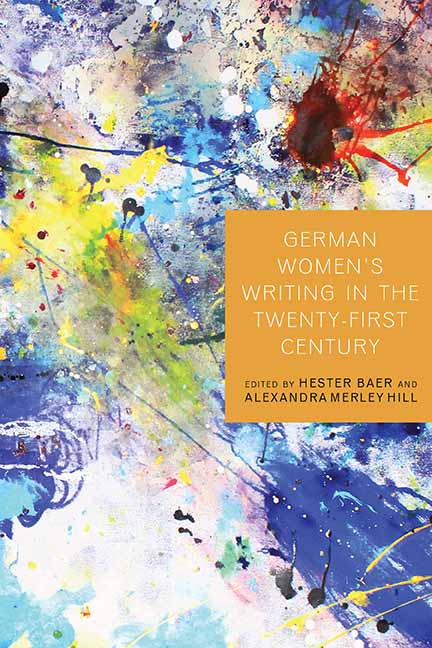Book contents
- Frontmatter
- Dedication
- Contents
- Acknowledgments
- Introduction: German Women’s Writing Beyond the Gender Binary
- 1 Language-Bodies: Interpellation and Gender Transition in Antje Rávic Strubel’s Kältere Schichten der Luft and Judith Hermann’s “Sonja”
- 2 Matrilineal Narrative and the Feminist Family Romance
- 3 The Pitfalls of Constructing a Female Genealogy: Cultural Memory of National Socialism in Recent Family Narratives
- 4 Reckoning with God: Attitudes toward Religion in German-Language Women’s Writing in the Twenty-First Century
- 5 Muslim Writing, Women’s Writing
- 6 Popfeminism, Ethnicity, and Race in Contemporary Germany: Hatice Akyün’s Popfeminist Autobiographic Works Einmal Hans mit scharfer Soße (2005) and Ali zum Dessert (2008)
- 7 The Awkward Politics of Popfeminist Literary Events: Helene Hegemann, Charlotte Roche, and Lady Bitch Ray
- 8 The Indictment of Neoliberalism and Communism in the Novels of Katharina Hacker, Nikola Richter, Judith Schalansky, and Julia Schoch
- 9 Sounds of Silence: Rape and Representation in Juli Zeh’s Bosnian Travelogue
- Bibliography
- Notes on the Contributors
- Index
6 - Popfeminism, Ethnicity, and Race in Contemporary Germany: Hatice Akyün’s Popfeminist Autobiographic Works Einmal Hans mit scharfer Soße (2005) and Ali zum Dessert (2008)
Published online by Cambridge University Press: 25 May 2021
- Frontmatter
- Dedication
- Contents
- Acknowledgments
- Introduction: German Women’s Writing Beyond the Gender Binary
- 1 Language-Bodies: Interpellation and Gender Transition in Antje Rávic Strubel’s Kältere Schichten der Luft and Judith Hermann’s “Sonja”
- 2 Matrilineal Narrative and the Feminist Family Romance
- 3 The Pitfalls of Constructing a Female Genealogy: Cultural Memory of National Socialism in Recent Family Narratives
- 4 Reckoning with God: Attitudes toward Religion in German-Language Women’s Writing in the Twenty-First Century
- 5 Muslim Writing, Women’s Writing
- 6 Popfeminism, Ethnicity, and Race in Contemporary Germany: Hatice Akyün’s Popfeminist Autobiographic Works Einmal Hans mit scharfer Soße (2005) and Ali zum Dessert (2008)
- 7 The Awkward Politics of Popfeminist Literary Events: Helene Hegemann, Charlotte Roche, and Lady Bitch Ray
- 8 The Indictment of Neoliberalism and Communism in the Novels of Katharina Hacker, Nikola Richter, Judith Schalansky, and Julia Schoch
- 9 Sounds of Silence: Rape and Representation in Juli Zeh’s Bosnian Travelogue
- Bibliography
- Notes on the Contributors
- Index
Summary
IN RECENT YEARS several scholars have investigated the role of popfeminism, a term coined in 2007 by Sonja Eismann, which denotes Germany's own version of contemporary feminism. While these scholars have scrutinized the relationship between popfeminism, pop literature, and neoliberalism, and they have pointed out the absence of concepts of race and ethnicity in numerous popfeminist texts, they have paid little attention to those popfeminist works that do analyze the intersections between sexuality, race, and ethnicity. In this essay I address this gap by investigating the humor-inflected popfeminist autobiographical works Einmal Hans mit scharfer Soße (An Order of Hans with Hot Sauce, 2005) and its sequel, Ali zum Dessert (Ali for Dessert, 2008) by the Turkish-German journalist Hatice Akyün. As is typical for popfeminist writing, Akyün uses pop tropes such as sampling, remixing, and resignification to present an independent, career-oriented woman who enjoys consumer empowerment and sexual agency while, significantly, she is also critical of the sexism and racism that operate in German society. The celebration of consumerism is a fundamental aspect of popfeminism that resignifies consumption as pleasure, which contrasts with its rejection in second-wave feminism. While Akyün shares with other popfeminist writers the use of an individualist approach manifested in the form of the autobiography, her books stand out because they emphasize sexual agency in the context of a modern, highly cross-cultural Turkish-German female identity.
Akyün is not the only female author to explore the identity of modern Turkish-German women, a topic also depicted in Iris Alanyali's Die blaue Reise (The Blue Journey, 2009), Dilek Güngör's Unter uns (Among Us, 2004) and Ganz schön deutsch (Very German Indeed, 2007), and Hilal Sezgin's Typisch Türkin? (Typical Turkish Woman?, 2006). While all these books examine the complexity of contemporary, modern Turkish-German female identity and defy stereotypes about Muslim families generally viewed as oppressive toward women, there are significant differences between them and Akyün's work. Neither Alanyali's nor Güngör's jovial books display the sexual openness and incisive scrutiny of racism and sexism present in Akyün's texts. Furthermore, whereas Sezgin's work criticizes the intersectionality of sexism and racism, her project differs from Akyün's generically and stylistically, as it is a collection of interviews of first-and second-generation Turkish-German women in which humor plays no role.
- Type
- Chapter
- Information
- German Women's Writing in the Twenty-First Century , pp. 113 - 131Publisher: Boydell & BrewerPrint publication year: 2015

